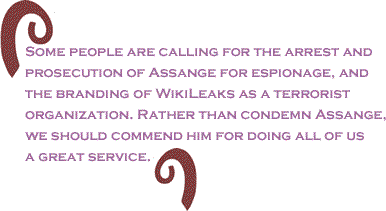| I find it interesting, though
not surprising, that most discussions in the media about
WikiLeaks focus on the suitable form of punishment for its
editor-in-chief Julian Assange, rather than the nature of
the diplomatic correspondence he and his organization have
shared with the public. None of the documents were top secret—as they were either labeled secret, confidential or classified— and arguably
they should be a part of the public domain. Some people are calling for the arrest and prosecution of Assange for espionage,
and the branding of WikiLeaks as a terrorist organization.
Rather than condemn Assange, we should commend him for doing
all of us a great service.
Commenting on the good that can come from openness and transparency, Supreme
Court Justice Louis Brandeis once said that “sunlight is
the best disinfectant.” Well, today we find ourselves in
a foul, germ-ridden place, where official misconduct is
allowed to breed, infect the body politic and fester. Things
are done in the name of the American people that would outrage
them if they really knew the truth. And some past generations
had the benefit of brave individuals to shine the light
and clear up the stench, and they were all the better for
it.

Without question, Noam Chomsky said it best in a recent interview with Democracy Now! “One of the major reasons
for government secrecy is to protect the government from
its own population,” Chomsky said. Of the similarity of
WikiLeaks to the Pentagon Papers— a top secret history of
the Vietnam War first published in the New York Times—Chomsky
noted:
“But if you look at the Papers themselves, there are things that Americans should
have known that the government didn’t want them to know.
And as far as I can tell, from what I’ve seen here, pretty
much the same is true. In fact, the current leaks are—what
I’ve seen, at least—primarily interesting because of what
they tell us about how the diplomatic service works.”
The Pentagon Papers revealed that the Johnson administration had lied about
the Vietnam War, deliberately expanding the war in private
while telling another story in public. In recent years
America has been faced with two costly, deadly and seemingly
useless wars in Iraq and Afghanistan. The latter is causing
the nation to bleed $2.8 billion a week. And the military-industrial complex eats up half of the government’s discretionary
spending when other nations prefer to spend
their money on high-speed rail and green technology. This
comes at a time when Wall Street is awash with record profits,
yet millions are chronically unemployed. Meanwhile, the
gap between rich and poor, the highest since 1928, is turning
the U.S. into a nation of serfs. This is why we must embrace
the spirit of WikiLeaks in 2010 and beyond, to inform citizens
of potentially disastrous government decision making while
something can be done to avert catastrophe.

In 1906—65 years before the Pentagon Papers and over a century before WikiLeaks—
Upton Sinclair applied his own brand of disinfectant called
The
Jungle. His novel depicted the harsh conditions of the meat-packing
industry, of diseased animals and dead rats finding their
way to the dinner table. Ultimately, the visceral public
reaction to The Jungle led to government reform of
the food industry. More importantly, Sinclair shed light
on the plight of poor and working people, on racism and
immigration, on wage slavery, and the greed and corruption
of people at the top. It was a book about an era when,
like today, capitalism ran amok. Every generation might
not get an Upton Sinclair to make things right, and some
generations need one more than others. At a time when some
in the media are far too eager to embed themselves in power
rather than expose the powerful, the second decade of the
twenty-first century desperately screams out for sunlight.
Julian Assange is Upton Sinclair exposing the rotten meat. The message is,
don't buy the rotten meat, or the rotten wars they're trying
to sell to you. No wonder Bank of America is worried that
they could be next.

BlackCommentator.com Executive Editor, David A. Love, JD is a journalist and human rights
advocate based in Philadelphia, and a contributor to The Huffington Post, theGrio, The Progressive Media Project, McClatchy-Tribune News Service, In These Times and Philadelphia Independent Media Center. He
also blogs at davidalove.com, NewsOne, Daily Kos, and Open Salon. Click here to contact Mr. Love.
|

